非谓语动词
非谓语动词讲解(超全)
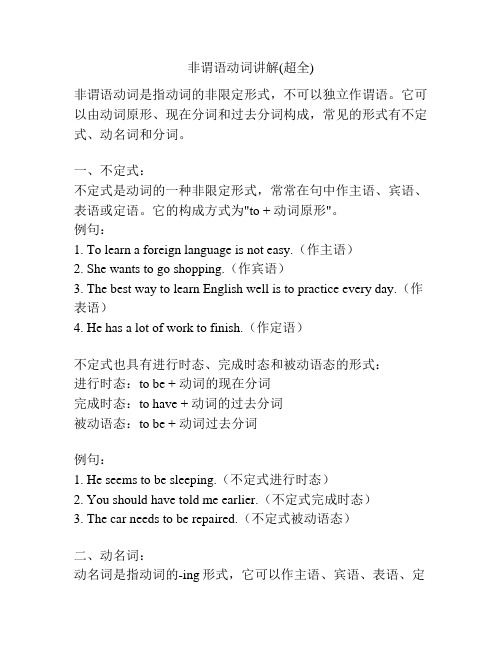
非谓语动词讲解(超全)非谓语动词是指动词的非限定形式,不可以独立作谓语。
它可以由动词原形、现在分词和过去分词构成,常见的形式有不定式、动名词和分词。
一、不定式:不定式是动词的一种非限定形式,常常在句中作主语、宾语、表语或定语。
它的构成方式为"to + 动词原形"。
例句:1. To learn a foreign language is not easy.(作主语)2. She wants to go shopping.(作宾语)3. The best way to learn English well is to practice every day.(作表语)4. He has a lot of work to finish.(作定语)不定式也具有进行时态、完成时态和被动语态的形式:进行时态:to be + 动词的现在分词完成时态:to have + 动词的过去分词被动语态:to be + 动词过去分词例句:1. He seems to be sleeping.(不定式进行时态)2. You should have told me earlier.(不定式完成时态)3. The car needs to be repaired.(不定式被动语态)二、动名词:动名词是指动词的-ing形式,它可以作主语、宾语、表语、定语或状语。
在句中的位置和用法与名词相似。
例句:1. Reading is my favorite hobby.(作主语)2. I enjoy swimming in the summer.(作宾语)3. Her dream is becoming a famous singer.(作表语)4. The girl standing over there is my sister.(作定语)5. He went to the party without saying goodbye.(作状语)动名词与不定式的区别在于动名词具有进行时态和被动语态,而不定式没有。
非谓语动词三大形式
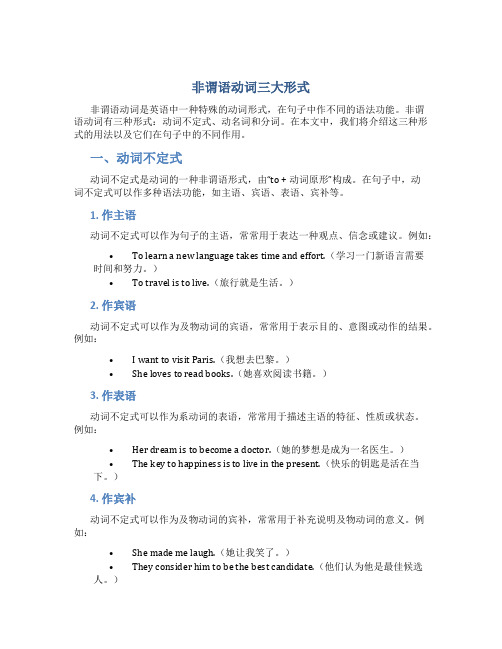
非谓语动词三大形式非谓语动词是英语中一种特殊的动词形式,在句子中作不同的语法功能。
非谓语动词有三种形式:动词不定式、动名词和分词。
在本文中,我们将介绍这三种形式的用法以及它们在句子中的不同作用。
一、动词不定式动词不定式是动词的一种非谓语形式,由“to + 动词原形”构成。
在句子中,动词不定式可以作多种语法功能,如主语、宾语、表语、宾补等。
1. 作主语动词不定式可以作为句子的主语,常常用于表达一种观点、信念或建议。
例如:•To learn a new language takes time and effort.(学习一门新语言需要时间和努力。
)•To travel is to live.(旅行就是生活。
)2. 作宾语动词不定式可以作为及物动词的宾语,常常用于表示目的、意图或动作的结果。
例如:•I want to visit Paris.(我想去巴黎。
)•She loves to read books.(她喜欢阅读书籍。
)3. 作表语动词不定式可以作为系动词的表语,常常用于描述主语的特征、性质或状态。
例如:•Her dream is to become a doctor.(她的梦想是成为一名医生。
)•The key to happiness is to live in the present.(快乐的钥匙是活在当下。
)4. 作宾补动词不定式可以作为及物动词的宾补,常常用于补充说明及物动词的意义。
例如:•She made me laugh.(她让我笑了。
)•They consider him to be the best candidate.(他们认为他是最佳候选人。
)二、动名词动名词是动词的一种非谓语形式,以-ing结尾。
在句子中,动名词可以作多种语法功能,如主语、宾语、表语、宾补等。
1. 作主语动名词可以作为句子的主语,常常用于表示一种习惯、经验或普遍情况。
例如:•Running helps to keep me fit.(跑步有助于保持健康。
非谓语动词的种类与非谓语动词的形式

非谓语动词的种类与非谓语动词的形式一、非谓语动词的种类非谓语动词是指在句子中不作谓语,通常用作句子的其他成分或修饰动词、形容词等的动词形式。
根据其形式和语义特点,非谓语动词可分为以下几种类型:1. 原形动词:即动词的原始形态,通常具有动作或状态的意义。
例如:to go(去)、to eat(吃)、to sleep(睡觉)等。
2. 动名词:由动词的-ing形式构成,常用作名词,表示动作、状态或具体事物。
例如:swimming(游泳)、running(跑步)、drinking (喝水)等。
3. 不定式:由to + 动词原形构成,可作名词、形容词、副词或动词的补语等。
例如:to read(读书)、to be(是)、to help(帮助)等。
4. 分词:根据用途和构成方式的不同,分词可分为现在分词和过去分词。
a. 现在分词:以-ing结尾的动词形式,可表示同时进行的动作或被动形式。
例如:running(跑步的)、working(工作的)等。
b. 过去分词:通常为动词的第三人称单数形态或以-ed、-en等结尾,可表示被动、完成或完成时态等。
例如:spoken(说过的)、written(写过的)等。
二、非谓语动词的形式非谓语动词的形式与其种类相关,可根据种类的不同确定其形式:1. 原形动词:原形动词本身即为其形式,无需变化。
例如:to go (去)。
2. 动名词:动名词的形式是将动词的原形加上-ing。
例如:swimming(游泳)。
3. 不定式:不定式的形式为to + 动词原形。
例如:to read(读书)。
4. 分词:a. 现在分词:以-ing结尾。
例如:running(跑步的)。
b. 过去分词:根据动词的不同,过去分词的形式有多种形式,例如:- 以-ed结尾的过去分词,如spoken(说过的)。
- 以-en结尾的过去分词,如written(写过的)。
通过上述介绍,我们可以清晰地了解非谓语动词的种类及其相应的形式。
非谓语动词讲解归纳

非谓语动词讲解归纳非谓语动词是指在句子中充当谓语的动词形式,不具备人称和数的变化,也不与主语保持一致。
常见的非谓语动词有动词不定式、动名词和分词。
下面我将对这三种非谓语动词进行讲解和归纳。
1. 动词不定式:动词不定式是动词的一种非谓语形式,一般由“to + 动词原形”构成,例如:"to read","to eat"。
动词不定式的用法:a. 作主语:To travel is my dream.(旅行是我的梦想)b. 作宾语:I want to eat an apple.(我想吃一个苹果)c. 作补语:Her dream is to become a doctor.(她的梦想是成为一名医生)d. 作定语:We need someone to help us.(我们需要有人帮助我们)2. 动名词:动名词是将动词变为名词的一种形式,一般以-ing结尾,例如:"reading","writing"。
动名词的用法:a. 作主语:Reading is my hobby.(读书是我的爱好)b. 作宾语:I enjoy swimming in the summer.(我喜欢夏天游泳)c. 作定语:I have a writing notebook.(我有一个写作笔记本)d. 作表语:Her favorite activity is dancing.(她最喜欢的活动是跳舞)3. 分词:分词是动词的一种非谓语形式,一般以-ing或-ed结尾,分别称为现在分词和过去分词,例如:"running","cooked"。
分词的用法:a. 现在分词作定语:The running water is very clean.(流动的水很干净)b. 过去分词作定语:The cooked chicken smells delicious.(煮熟的鸡肉闻起来很香)c. 分词作伴随状语:Hearing the news, she smiled happily.(听到消息,她高兴地笑了)需要注意的是,非谓语动词的形式可以有时态和语态的变化,如不定式可以有完成和进行的形式,动名词可以有进行和完成的形式,分词可以有进行、完成和被动的形式。
非谓语动词的种类和用法
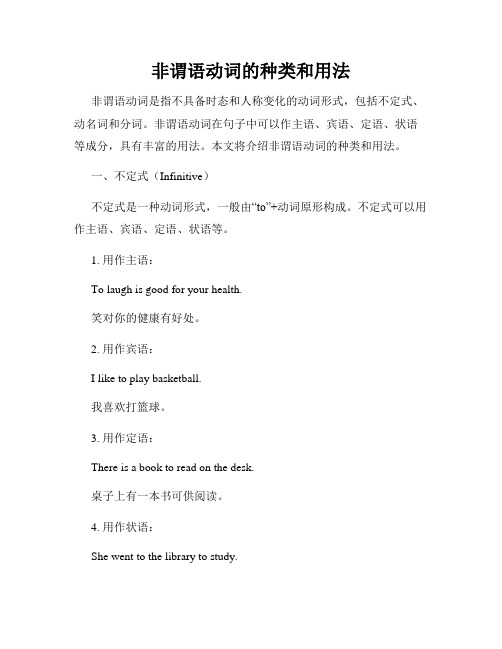
非谓语动词的种类和用法非谓语动词是指不具备时态和人称变化的动词形式,包括不定式、动名词和分词。
非谓语动词在句子中可以作主语、宾语、定语、状语等成分,具有丰富的用法。
本文将介绍非谓语动词的种类和用法。
一、不定式(Infinitive)不定式是一种动词形式,一般由“to”+动词原形构成。
不定式可以用作主语、宾语、定语、状语等。
1. 用作主语:To laugh is good for your health.笑对你的健康有好处。
2. 用作宾语:I like to play basketball.我喜欢打篮球。
3. 用作定语:There is a book to read on the desk.桌子上有一本书可供阅读。
4. 用作状语:She went to the library to study.她去图书馆学习。
二、动名词(Gerund)动名词是一种名词形式,一般由动词原形+ing构成。
动名词可以用作主语、宾语、定语、状语等。
1. 用作主语:Swimming is my favorite sport.游泳是我最喜欢的运动。
2. 用作宾语:I enjoy reading books.我喜欢读书。
3. 用作定语:He likes playing football.他喜欢踢足球。
4. 用作状语:They left without saying goodbye.他们离开时没有说再见。
三、分词(Participle)分词是动词的一种形式,有现在分词和过去分词两种形式。
分词可以用作定语、状语等。
1. 现在分词作定语:The running water is very clean.流动的水非常清洁。
2. 过去分词作定语:The broken window needs to be fixed.破窗户需要修理。
3. 分词作状语:Feeling tired, she decided to take a break.感到疲倦,她决定休息一下。
非谓语动词(Non-finiteverbs)
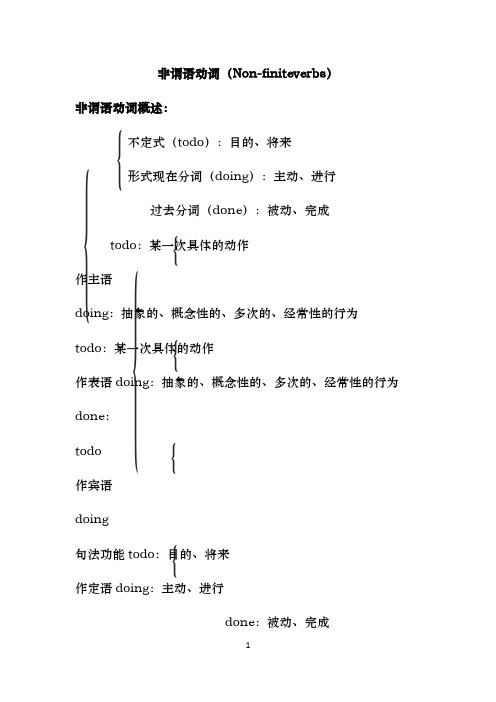
非谓语动词(Non-finiteverbs)非谓语动词概述:不定式(todo):目的、将来形式现在分词(doing):主动、进行过去分词(done):被动、完成todo:某一次具体的动作作主语doing:抽象的、概念性的、多次的、经常性的行为todo:某一次具体的动作作表语doing:抽象的、概念性的、多次的、经常性的行为done:todo作宾语doing句法功能todo:目的、将来作定语doing:主动、进行done:被动、完成todo:目的、将来作宾补doing:主动、进行done:被动、完成todo:目的、将来作状语doing:主动、进行done:被动、完成独立成分作状语n./pron.+todo/doing/done独立主格结构with的复合结构GrammarI:非谓语动词的形式(一)过去分词:过去分词只有一种形式,就是一般式done。
①单独表示一个被动的动作;②也可以单独表示动作已经完成;③还可以同时表示被动和完成。
(二)现在分词的各种形式:(三)主动被动用法一般doing beingdone doing的动作与谓语动作几e.g.1._______________(hear)thenews,theycouldn’thelpla ughing.e.g.2.Not________________(finish)thetask,theyhavetostayt hereforanothertwoweeks.e.g.3.________________(turn)offtheTVset,hebegantogoover (复习)hislessons.e.g.4.______________(heat加热),thewatergetshot.e.g.5._______________(build)forhalfayear,thebuildingbeca meourlibrary.e.g.6._______________(tell)manytimes,hestillrepeated(重复)thesamemistake.e.g.7.Isawtherewasaboy________________(blame)byhisfat her.(四)不定式的各种形式(五)e.g.1.Therearemanydishes_________________(wash)inthek itchen.SoIdon’thavetimetoseeafilmwithyoutonight.注意:非谓语动词的否定形式是在其前加notGrammarII:todo、doing作主语或表语一、todo、doing作主语的一般用法:e.g.1.Toswimtodayisagoodideae.g.2.Eatingtoomuchisbad foryourhealth.思考:todo作主语,表__________________________________________________的动作;doing作主语,表_________________________________________________的动作。
非谓语动词9种形式

非谓语动词9种形式
1.不定式:to+动词原形,表示目的、原因、结果等。
2. 现在分词:动词+ing,表示主动、进行或描述。
3. 过去分词:动词+ed,表示被动、完成或描述。
4. 动名词:动词+ing,作主语、宾语或介词后的宾语。
5. 分词短语:现在分词或过去分词+其他成分,作状语或定语。
6. 带to的分词短语:to+过去分词,表示被动或完成,作状语或定语。
7. 带having的分词短语:having+过去分词,表示完成,作状语或定语。
8. 带不定式的分词短语:动词+不定式,表示目的、结果、方式,作状语或定语。
9. 带介词的分词短语:动词+介词+现在分词或过去分词,作状语或定语。
- 1 -。
什么是非谓语动词

什么是非谓语动词在英语语法中,非谓语动词是一类特殊的动词形式,它不具备谓语动词的一些特征,如时态和人称的变化。
非谓语动词包括动词的不定式(infinitive)、动名词(gerund)和分词(participle)。
非谓语动词在句子中可以作为名词、形容词或副词的成分。
1. 不定式(infinitive)不定式是非谓语动词中最常见的形式之一。
它通常由动词的词根形式加上to构成,例如to go、to eat、to learn等。
不定式可以用作名词、形容词或副词。
作为名词时,不定式可以做主语、宾语、表语等。
例如:- To travel is my dream.(去旅行是我的梦想。
)- He wants to buy a new car.(他想买一辆新车。
)作为形容词时,不定式可以修饰名词,并用来表达目的、原因、结果等。
例如:- He needs a book to study.(他需要一本书来学习。
)- I am happy to see you.(我很高兴见到你。
)作为副词时,不定式用来修饰动词、形容词或副词,表示目的、结果、方式等。
例如:- She works hard to succeed.(她努力工作以获得成功。
)- He walked slowly to avoid falling.(他慢慢地走以避免摔倒。
)2. 动名词(gerund)动名词是动词的-ing形式,它可以作为一个名词在句子中使用。
与不定式不同,动名词可以作为主语、宾语、表语、介词宾语等。
例如:- Swimming is good exercise.(游泳是一项好的锻炼。
)- I enjoy singing.(我喜欢唱歌。
)动名词也可以与一些特定的动词或动词短语搭配使用,这些短语通常以动名词作为宾语。
例如:- He admitted stealing the money.(他承认偷了钱。
)- She can't help laughing.(她禁不住笑。
非谓语动词讲解(超全

非谓语动词讲解(超全非谓语动词是指动词的非谓语形式,包括动词不定式、动名词和现在分词。
与主谓结构不同,非谓语动词可在句子中作状语、定语或表语。
在英语中,非谓语动词的形式是相对固定的,但在不同的语法环境中所表示的意义和用法有所差异。
1. 动词不定式(to-infinitive)动词不定式由“to + 动词原形”构成,常常用作动词的宾语、主语、状语或定语。
例如:- 宾语:I want to go to the zoo.(我想去动物园。
)- 主语:To speak English fluently is important for your career.(流利地说英语对你的事业很重要。
)- 状语:He went to the store to buy some groceries.(他去商店买了些杂货。
)- 定语:She needs a pen to write her essay.(她需要一支笔来写作文。
)2. 动名词(gerund)动名词是将动词加上-ing构成,常常用作动词的宾语、主语、状语或定语。
例如:- 宾语:I enjoy reading books in my spare time.(我闲暇时喜欢读书。
)- 主语:Swimming is good exercise.(游泳是很好的锻炼。
)- 状语:She left the party early, feeling tired.(她因为感觉累了,所以提前离开了聚会。
)- 定语:The crying baby woke up the whole neighborhood.(哭闹的婴儿把整个邻居都吵醒了。
)3. 现在分词(present participle)现在分词由动词原形加上-ing构成,常常用作动词的宾语、主语、状语或定语。
例如:- 宾语:He enjoys playing soccer on weekends.(他喜欢周末踢足球。
)- 主语:Listening to music helps me relax.(听音乐帮助我放松。
非谓语动词
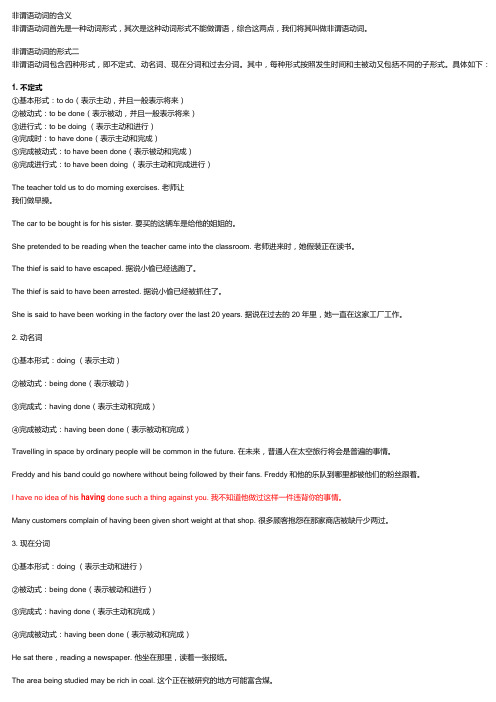
非谓语动词的含义非谓语动词首先是一种动词形式,其次是这种动词形式不能做谓语,综合这两点,我们将其叫做非谓语动词。
非谓语动词的形式二非谓语动词包含四种形式,即不定式、动名词、现在分词和过去分词。
其中,每种形式按照发生时间和主被动又包括不同的子形式。
具体如下:1. 不定式①基本形式:to do(表示主动,并且一般表示将来)②被动式:to be done(表示被动,并且一般表示将来)③进行式:to be doing (表示主动和进行)④完成时:to have done(表示主动和完成)⑤完成被动式:to have been done(表示被动和完成)⑥完成进行式:to have been doing (表示主动和完成进行)The teacher told us to do morning exercises. 老师让我们做早操。
The car to be bought is for his sister. 要买的这辆车是给他的姐姐的。
She pretended to be reading when the teacher came into the classroom. 老师进来时,她假装正在读书。
The thief is said to have escaped. 据说小偷已经逃跑了。
The thief is said to have been arrested. 据说小偷已经被抓住了。
She is said to have been working in the factory over the last 20 years. 据说在过去的20年里,她一直在这家工厂工作。
2. 动名词①基本形式:doing (表示主动)②被动式:being done(表示被动)③完成式:having done(表示主动和完成)④完成被动式:having been done(表示被动和完成)Travelling in space by ordinary people will be common in the future. 在未来,普通人在太空旅行将会是普遍的事情。
非谓语动词(non-finite verbs)

在英语中,不做句子谓语,而具有谓语外其他语法功能的动词中,叫“非谓语动词”非谓语动词包括:动词不定式(the Infinitive)动名词(the Gerund)现在分词(the Present Participle)过去分词(the Past Participle)Ⅰ。
动词不定式:动词不定式有两种,带“to”和不带“to(动词原型)”,有人称之为“光秃不定式”,在大多数情况下不定式都带to,动词不定式由“to+动词原型”,这里的to是不定式标志,没有词义,不定式具有名词,形容词,或副词的某些语法功能,又有动词的时态和语态。
一:1。
不定式做主语:eg : To over come the problem is very difficult不定式做主语,往往用it做形式主语,真正的主语不定式放置句子后面:eg : It‟s so nice to hear your voice.但是,用不定式做主语的句子中还有一个不定式做表语时,不能用it‟s…to…的句型eg : To teach is to learn.比较“it‟s for sb和it‟s of sb1)for sb句型中的形容词一般为表示事物的特征特点,表示客观形式的形容词,如”easy, hard, difficult, impossible”等2)of sb句型中的形容词一般为表示性格,品德,心智能力,表示主观感情或态度的形容词,如”good, kind, nice, clever, foolish”等3)用介词for或者of后面的逻辑主语做句子的主格,用介词前边的形容词做表语,造这个句子,如果通顺用of,不通则用for2.不定式做表语:不定式可放在be动词后面,形成表语eg : My dream is to be a teacher.3.不定式做宾语1)有些及物动词用不定式做宾语,结构为“动词+不定式”P2892)有些动词除了可以用不定式做宾语,还用些不定式做补语,即“动词+宾语+不定式”结构eg : I like to keep everything tidy.I like you to keep everything tidy.3)有些动词或动词词组可以用“动词+疑问词+不定式”的结构:eg : I want to know how to solve the problem.4)如果不定式(宾语)后面有宾语补足语,则用“ it ”做形式宾语,真正的宾语(不定式)后置,放在宾语补足语4.不定式做补语1)有些动词+宾语+不定式P291eg : Father will not allow us to play on the street.2)有些动词+宾语+不定式的结构,不定式的动词往往是be,不定式一般可以省去eg : We believe him (to be) quilty (adj.)我们相信他是有罪的We know him to be fool. (n.) (to be不能省)3)有些动词可以跟”there + to be的结构eg : We didn‟t expect there to be so many people.You wouldn‟t want there to be another war. 你不至于想让另外一场战争发生吧?5.不定式做定语不定式做宾语,通常要放在被修饰的词后,往往表示未发生的动作。
非谓语动词的定义是什么意思

非谓语动词的定义是什么意思非谓语动词的定义是什么意思非谓语动词,又叫非限定动词,非谓语动词是指在句子中不是谓语的动词,主要包括不定式、动名词和分词(现在分词和过去分词),即动词的非谓语形式。
下面是店铺给大家整理的非谓语动词的定义简介,希望能帮到大家!非谓语动词的定义在句子中充当除谓语以外的各种句子成分的动词形式,叫做非谓语动词(the Non-Finite Verbs)。
非谓语动词也是动词的一种,他们有着动词的其他特点,可以充当主语、宾语、状语等。
非谓语动词与谓语动词是相对的概念。
非谓语动词与谓语动词相同点如果是及物动词都可与宾语连用,例如:They built a garden.They suggested building a garden.都可以被状语修饰:The suit fits him very well.The suit used to fit him very well.都有主动与被动,“体”式(一般式;进行式;完成式)的变化。
例如:He was punished by his parents.(谓语动词被动语态)He avoided being punished by his parents.(动名词的被动式)We have written the composition.(谓语动词的完成时)Having written the composition,we handed it in.(现在分词的完成式)都可以有逻辑主语They started the work at once.(谓语动词的逻辑主语)The boss ordered them to start the work.(动词不定式的逻辑主语)We are League members.(谓语动词的主语)We being League member,the work was well done. (现在分词的逻辑主语)否定式一般用not,并且放在非谓语动词之前不同点非谓语动词可以有名词作用(如动词不定式和动名词),在句中做主语、宾语、表语。
非谓语动词讲解以及例句

非谓语动词讲解以及例句非谓语动词是指动词的非谓语形式,不受主语的人称和数的限制,常用作句子的宾语、定语或状语。
非谓语动词包括动名词、不定式和分词三种形式。
一、动名词(-ing形式):1. 作主语:Being kind to others is always a good thing to do.(对他人友善总是值得做的好事。
)2. 作宾语:I enjoy swimming in the ocean.(我喜欢在海里游泳。
)3. 作宾补:She made a decision, ending their relationship.(她做出了一个决定,结束了他们的关系。
)4. 作定语:The running water is so clear and refreshing.(流动的水非常清澈和令人神清气爽。
)5. 作状语:Knowing the answer, he raised his hand.(知道答案后,他举手了。
)二、不定式(to + 动词原形):1. 作主语:To learn a new language is challenging but rewarding.(学习一门新语言是具有挑战性但值得的。
)2. 作宾语:She wants to visit Paris next year.(她想明年去巴黎旅游。
)3. 作宾补:I need to finish this report by tomorrow.(我需要明天之前完成这份报告。
)4. 作定语:He is the best person to ask for help.(他是寻求帮助的最佳人选。
)5. 作状语:She went to the library to study.(她去图书馆学习。
)三、分词:1. 现在分词(-ing形式):The crying baby woke up the entire neighborhood.(哭闹的婴儿吵醒了整个社区。
非谓语动词有哪些 什么是非谓语动词

非谓语动词有哪些什么是非谓语动词
在句子中充当除谓语以外的句子的各种成分的动词形式,叫做非谓语动词。
那么非谓语动词有哪些情况呢?
非谓语动词有哪些
1非谓语动词
非谓语动词有5种情况,分别是动词做主语、动词作宾语、动词作定语、动词作状语、动词作补语,动词作宾语示例:I like watching TV,这就把它变成了ing形式,把它名词化这就叫动词做宾语。
再看动词作定语he is a boy lying under the tree。
lying就是定语修饰boy。
躺在树下的男孩。
再看做状语的。
hearing the news she went crazy。
听到消息她疯了。
听到消息就是一个状态。
hearing the news she went crazy。
这里需要注意的是,从句部分根本不是一个句子,它只是一个动词,所以这个部分呢,我们就要把它叫动词做状语,而不能叫状语从句。
所以非谓语动词一共是5种情况,动词分别做主语、宾语,定语、状语、补语。
2非谓语动词与谓语动词不同点
非谓语动词可以有名词作用(如动词不定式和动名词),在句中做主语、宾语、表语。
非谓语动词可以有形容词作用(如动词不定式和分词),在句中做定语、表语或宾语补足语。
非谓语动词可以有副词作用(如动词不定式和分词),在句中作状语。
谓语动词在句中作谓语,受主语的人称和数的限制;非谓语动词在句中不能单独作谓语,它不受主语的人称和数的限制。
英语中不能单独做句子的谓语。
非谓语动词非谓语形式(详细)

非谓语动词非谓语形式(详细)动词非谓语形式一.基本概念:顾名思义,不担任谓语成分而担任其他语法功能的动词称为非谓语动词,有to do(动词不定式)/ -ing(现在分词/动名词)/ -ed(过去分词)三个形式。
由于他们不受主语人称和数的限制,故也称为"非限定动词"。
(研究中不要刻意去区分现在分词和动名词)二.非谓语动词的时态和语态意义:英语中动词有两大基本特征:时态和语态的变化。
非谓语动词也是动词,当然也具备动词的这两大特征。
1.时态概念:非谓语动词只有"过去、现在和将来"三个时间概念,他与谓语动词时态的区别是:谓语动词表示的是实际时间概念,如I am learning English.是指讲话的时候或那段时间里"我正在学英语"。
而非谓语动词的"过去、现在和将来"是指相对于谓语动词而言的"过去、现在和将来",即先于谓语动词的行为或状态称为"过去时",与谓语动词的行为或状态发生在同一时间(段)的称为"现在时",而发生在谓语动词的行为或状态之后的称为"将来时"。
这个时间概念对于后面要讲的非谓语动词的句法功能是非常重要的。
2.语态概念:与谓语动词一样,非谓语动词也有主动语态和被动语态之分。
也就是要记住四句话:(1)表示将来时;(2)表示现在时;(3)表示曩昔时(一定是被动的)(4)动词不定式的完成时表示过去时非谓语动词的上述时态和语态概念是理解非谓语动词句法功能、应试判题和翻译的基础。
请你判断一下,下面句子中的非谓语动词是什么时态和语态:Your duty is to look after the sick child。
(你的责任是照料这个病孩。
将来/主动)The sick child needs to be looked after by a special person。
非谓语动词-非谓语动词

.
非谓语动词具有以下特征:
• 非谓语动词可以做主语、宾语等多种句子成分, 但唯独不能做谓语。
• 非谓语动词具有各种形态:原形、主动语态、被 动语态、进行时态和完成时态。
.
非谓语动词在句中充当的成分
★★
★
★
★
★★
★★
★
★
★
★★
★
★
★★
.
不定式、动名词用作主语
1.直接作主语: Seeing is believing. Smoking is not a good habit. To see is to believe. To smoke here is dangerous. 2.用it作形式主语 It’s no use talking too much without doing
.
非谓语动词的否定形式
• 所有非谓语动词的否定形式都是直接在其前面加 上not.
• 不定式的否定形式:not to do • 动名词的否定形式:not doing • 现在分词的否定形式:not doing • 过去分词的否定形式:not done
.
1. Mrs. Smith warned her daughter ___A_____ after
anything. It’s no good smoking too much. It is very kind of you to say so. It’s not difficult for you to learn English grammar
非谓语动词是什么

非谓语动词是什么非谓语动词是动词的特殊形式,在句子中可以作谓语以外的所有成分。
非谓语动词包括动词ing形式,动词ed形式和不定式to do形式。
非谓语的基本形式一、动词ing形式动词ing形式包括现在分词和动名词。
动名词由动词原形加ing构成,有一般式、完成式。
1.动名词(一)作主语Seeing is believing.眼见为实。
Learning new words is very important.学习生词非常重要。
常见句型:It's + no use/ no good/ a waste of time + ing形式It's no use arguing about it.争论那件事毫无用处。
It's a waste of time your talking to him.你跟他说话,真是浪费时间。
(二)作宾语①以下动词后常跟动名词作宾语:love, like, hate, prefer, begin, enjoy,dislike, start, continue, intend, attempt, propose, want, need, remember, forget, neglect, try, deserve, involve, keep, mind, miss, postpone, resist, suggest.例如:I enjoy working with you.我喜欢和你共事。
Would you mind filling out this form?请你填这张表格好吗?②下列短语中的to均为介词,短语后使用动名词作宾语:attach importance to, be used to, devote…to, in addition to, look forward to, object to, be opposed to, approach to…例如:I was used to staying up late when I was in the college. 读大学我习惯熬夜。
- 1、下载文档前请自行甄别文档内容的完整性,平台不提供额外的编辑、内容补充、找答案等附加服务。
- 2、"仅部分预览"的文档,不可在线预览部分如存在完整性等问题,可反馈申请退款(可完整预览的文档不适用该条件!)。
- 3、如文档侵犯您的权益,请联系客服反馈,我们会尽快为您处理(人工客服工作时间:9:00-18:30)。
第五章非谓语动词本部分集中考察不定式,分词和动名词的重要用法和主要疑难点,如:能否说know to do it; catch sb .cheating是什么含义;用keep sb . informed还是用keep sb .to be informed. 等等。
请仔细答题。
A卷[全真题精读]1.The pressure_ ___causes Americans to be energetic , but it also puts them under a constant emotionalstain.(97.6)A .to competeB .competing C. to be competed D. having competed2. After being rescued from the air crash, the people agreed that they had much to____.(97.1)A .thankB .be thankedC .be thankfulD .be thankful for3. If I had remembered ____the window, the thief would not have got in .(96.1)A. to close B .closing C .to have closed D .having made4. There’s a man at the reception desk who seems very angry and I think he means trouble. (97.1)A. makingB. to makeC. to have makeD. having made5. There is more land in Australia than the government knows____. (89.1)A. what to do withB. how to doC. how to do withD. to do it6. _____ a teacher in a university, it is necessary to have at least a master’s degree. (95.1)A. To becomeB. BecomeC. One becomesD. On becoming7. John often attends pubic lectures at the University of Oxford chiefly____ his English. (92.1)A. to improveB. improvingC. to have improvedD. improved8. Mr. Smith advised us to withdraw______ (93.1)A. so that to get not involvedB. so as to get not involvedC. so as not to get involvedD. so that not to get involved9. Jim is sorry _____so impolite to your guest last Saturday. (92.1)A. to beB. having beenC. beingD. to have been10. This bird’s large wings_____ it to fly very fast. (92.1)A. makeB. enableC. ensureD. cause11. I have heard both teachers and students _____ well of him. (99.6)A. to speakB. spokenC. to have spokenD. speak12. My sister’s professor had her _____ paper many times before allowing her to present it to the committee.(89.1)A. rewrittenB. to rewriteC. rewritesD. rewriting13. They are going to have the servicemen ______ an electric fan in the office tomorrow. (97.12)A. to be installedB. to installC. installsD. installed14. The minister had his secretaries_____ a press conference. (93.1)A. arrangingB. to arrangeC. arrangeD. arranged15. If you don’t like to swim, you_____ stay at home.(95.1)A. should as wellB. may as wellC. can as wellD. would as well16. In the course of a day students do far more than just _____ classes. (93.6)A. attendB. attendedC. to attendD. attending17. That was so serious a matter that I had no choice but _____ the police. (96.1)A. called inB. calling inC. call inD. to call in18. Sir Denis, who is 78, has made it known that much of his collection_____ to the nation. (96.6)A. has leftB. is to leaveC. leavesD. is to be left19. I’d rather read than watch television, the programs seem_____ all the time. (97.1) .23.A. to get worseB. to be getting worseC. to have got worseD. getting worse20. Mrs. Brown is supposed_____ for Italy last week. (90.1)A. to have leftB. to be leavingC. to leaveD. to have been left21. A Dream of the Red Chamber is said_____ into dozens of languages in the last decade. (89.1)A. to have been translatedB. to translateC. to be translatedD. to have translated22. He moved away from his parents, and missed them_____ enjoy, the exciting life in New Y ork. (91.6)A. too much toB. enough toC. very much toD. much so as to23. Mr. Johnson preferred_____ heavier work o do. (93.6)A. to be givenB. to be givingC. to have givenD. having given24. The project, _____ by the end of 2000. Will expand the city’s telephone network to cover1,000,000users. (99.9)A .accomplished B. being accomplishedC. to be accomplished D .having been accomplished25. He thought that ________. (95.1)A .the effort doing the job was not worthB .the effort was not worth in doing the jobC .it was not worth the effort doing the jobD .it was not worth the effort by doing the job26. Ann never dreams of ________ of her to be sent abroad very soon. (98.6)A .there being a chance B. There be a chanceC .there to be a chanceD .being a chance27 .Mark often attempt to escape_______ whenever he breaks traffic regulation. (95.6)A .having been finedB .to having finedC .to be finedD .being fined28 .My wives said in her letter that she would appreciate________ from you sometime. (93.1)A. to have heardB. to hearC. for hearingD. hearing29. People appreciate_______ with him because he has a good sense of humor. (97.12)A .working B. to have worked C. to work D. Having worked30. I appreciate________ to you home. (91.6)A. to be invited B .to have invited C. having invited D. being invited31. They are considering _______before the price goes up. (89.1)A. of buying the houseB. with buying the houseC. Buying the houseD. to buy the house32. The teacher doesn’t permit ______in class. (91.6)A. smokeB. to smokeC. smokingD. to have a smoke33. Y our hair want ______.Y ou’d better have it done tomorrow. (97.6)A. cutB. to cutC. cuttingD. Being cut34. John regretted ______to the meeting last week. (90.1)A. not goingB. not to goC. not having been goingD. not to be going35. I remember ______to help us if we ever got into trouble. (93.6)A. once offeringB. him once offeringC. him to offerD. to offer him36. Peter, who had been driving all day, suggested______atthe nest town. (2000.6)A. stopB. to stop C .stopping D. having stomped37. Putting in a new window will ______ cutting away part of the roof (2000.6)A .containB .comprise C. include D. involve38. The traditional approach ______ with complex problems is to break them down into smaller, more easily managed problems (96.6)A. to dealingB. in dealingC. of being spentD. to spent39. He give people the impression _______all his life abroad. (98.6)A. of having spentB. to have spentC. of being spentD. to spent40. The man in the corner confessed to ______ a lie to the manager of the company. (97.6)A. have toldB. be toldC. being toldD. having told41. I have no objection ______ the evening with them. (95.1)A. to spend B .to spending C. of spending D. spending42. After ______for the job, you will be required to take a language test. (93.6)A. Being interviewedB. interviewedC. interviewingD. having interviewed43. The match was cancelled because most of the member ______ a match without a standards court.(99.1)A. objected to havingB. were objected to haveC. objected to haveD. were objected to having44. Jean did not have time to go to the concert last night because she was busy ______for her examination. (93.6)A. to prepareB. to be preparedC. preparingD. being prepared45. Its no use ______me not to worry. (89.1)A .you tell B. you’re tellingC. for you to have toldD. having told46. I would appreciate______ it a secret. (95.6)A. your keepingB. you to keepC. That you keepD. that you will keep47. I don’t mind ______ the decision as long as it is not too late. (2000.1)A. your delaying to makeB. you delay to makeC. your delaying makingD. you to delay making48. Although punctual himself, the professor was quite used ______late for his lecture. (97.12)A. to have studentsB. to students’ beingA. for students to be D. for students’being49. As early as 1674 Ohio made a decision that free, tax-supported schools must beestablished in every town---- 50households or more.(97.12)a. to haveb. havingc. to have hadd. having had50. If I correct someone, I will do it with as much as good humor and self-restraintas if I were the one----.(96.6)a. to correctb. Correctingc. having correctedd. being corrected51. This crop has similar qualities to the previous one,---- both wind—resistant and adapted to the same type of soil.(96.6)a. beingb. beenc. to bed. having been52. This programme will examine the writer’s books in detail,---- an introduction to her life。
